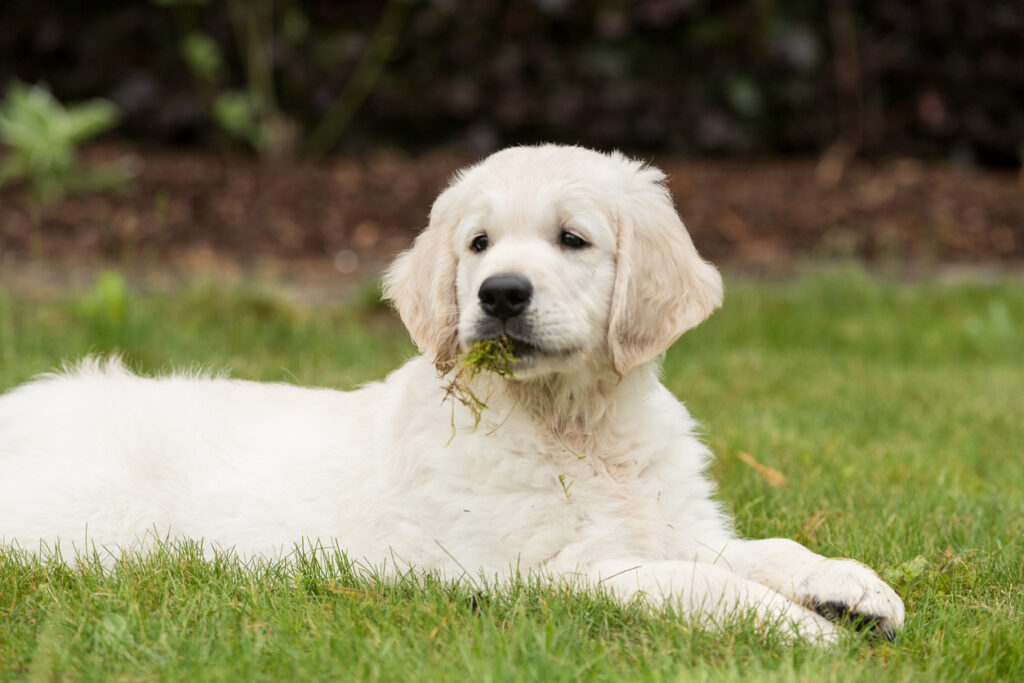Why Do Dogs Eat Grass?
Every dog owner will come across their dog eating grass at least once in their life. This is because eating grass is a common behavior in almost all dogs.
Dogs often eat grass as a remedy for an upset stomach. Nevertheless, this is not always the case, as some dogs might consume grass out of boredom or even for its taste.
In this article, we will be explaining everything that dog owners need to know about dogs eating grass. This will include explaining why dogs eat grass, whether or not it is ok to let your dog eat grass, and if you need to take your dog to the vet for eating grass.
5 Reasons Why Dogs Eat Grass
There are five main reasons why dogs eat grass. Some dogs will eat grass just because they like how it tastes or because it is a way for dogs to entertain themselves when they are bored. Other times, dogs will eat grass because they have an upset stomach, need more fiber in their diet, or have a diet deficiency.
1. Grass Tastes Good
Dogs are curious creatures by nature, and it’s not uncommon for them to experiment with different tastes and textures. For some dogs, the taste of grass can be appealing, and they might eat it as a form of exploration or simply because they find it delicious. In some cases, dogs may even develop a habit of eating grass regularly, even if they have no underlying health issues.

2. Your Dog is Bored
Dogs, like humans, can experience boredom and may resort to eating grass as a means of entertainment. This is especially true for dogs who spend extended periods in the backyard with little stimulation or interaction. While occasional grass-eating due to boredom is typically not a serious issue, excessive grass consumption can lead to gastrointestinal distress or other health problems. It’s essential to provide dogs with adequate exercise, playtime, and mental stimulation to prevent boredom and discourage excessive grass-eating behavior.
3. Your Dog Has an Upset Stomach
Dogs will commonly eat grass when they have an upset stomach. If your dog is eating grass and they are also having diarrhea or are vomiting, their stomach issues are likely the reason why. There are two reasons why dogs instinctively eat grass when they have an upset stomach. The first is that grass contains fiber, which can help soothe stomach problems. Additionally, grass has been shown to help settle their stomach by bringing the stomach’s pH level down and helps to soothe the pain and symptoms.
4. Your Dog Needs More Fiber
Since grass contains a lot of fiber, many dogs will eat grass simply because they need more fiber in their diet. Dogs with a poor diet may have loose stools or be constipated on a regular basis.
If you suspect that your dog is eating grass because they are not getting enough fiber, it may be a good idea to take a look at your dog’s diet and supplement them with some dog-safe fruits and vegetables. Here are some fruits and vegetables that are high in fiber and safe to give to dogs.
- Blueberries
- Carrots
- Apples (without the core or any seeds)
- Cantaloupe
- Watermelon
- Cucumbers
- Pumpkin
- Broccoli
- Celery
- Peas
- Green beans
- Spinach
Of course, it is still best to give these foods to your dog in moderation. This is because a diet that is too high in fiber can cause stomach upset in dogs just as much as a diet that is too low in fiber can.
5. Your Dog Has a Diet Deficiency
Some dogs will also eat grass because they have a diet deficiency. This means that a dog is not getting enough vitamins and minerals in their diet. This can occur when dogs have a medical condition or are not eating good quality dog food. If you are concerned that your dog may have a diet deficiency, then it is a good idea to consult with your vet.
Why Did My Dog Eat Grass and Then Throw It Up?
Dogs may eat grass for various reasons, such as to soothe an upset stomach or simply because they find it tasty. However, eating grass can cause dogs to vomit, which can be concerning for pet owners. In most cases, dogs will eat grass to make themselves vomit when they are feeling unwell or to alleviate digestive discomfort.
When a dog eats grass, it can cause irritation to their stomach lining, which triggers the vomiting reflex. Vomiting helps to rid the dog’s stomach of the grass and any other substances that may be causing discomfort or irritation. Additionally, eating large amounts of grass can cause a blockage in the digestive system, which can also lead to vomiting.
If your dog vomits after eating grass, it’s important to monitor them closely and ensure that they are drinking plenty of water to stay hydrated. If the vomiting persists or is accompanied by other symptoms, such as diarrhea or lethargy, it’s recommended to consult with a veterinarian to rule out any underlying health issues. In some cases, vomiting can be a sign of a more serious condition, such as gastroenteritis or pancreatitis, which may require medical treatment.
Is it OK to Let Your Dog Eat Grass?
For the most part, it is OK to let your dog eat grass occasionally. However, it is best to only allow your dog to eat grass on your property. This is because you will know for sure that this grass does not have any potentially toxic chemicals like pesticides and herbicides on it. It is also not a good idea to let your dog eat a lot of grass at one time, as doing this can make dogs sick.
Should You Take Your Dog to the Vet for Eating Grass?
Eating grass is a fairly normal, instinctual behavior in dogs. However, it may be a good idea to see a vet in a few instances of eating grass. It is a good idea to talk to your vet about your dog’s grass eating habits if:
- You suspect that there is something wrong with your dog’s diet (lack of fiber, vitamins and minerals, etc.)
- Your dog is vomiting or has diarrhea
- Your dog is showing any other symptoms of illness
- Your dog is showing signs of having a medical condition
- Your dog has just eaten a lot of grass at one time
- You suspect that your dog has eaten grass with a toxic treatment on it (pesticides, herbicides, etc.)
So Why Do Dogs Eat Grass?
In conclusion, dogs may eat grass for various reasons, including to soothe an upset stomach or simply because they find it tasty. While eating grass is generally not harmful, it can cause vomiting and other digestive issues in some dogs. Pet owners should monitor their dogs’ grass intake and be aware of any unusual behaviors or symptoms that may indicate an underlying health issue.
As a veterinary practice, we encourage Berthoud, CO area pet owners to consult with us if they have any concerns about their dogs’ grass eating habits. Our team of experienced veterinarians can provide guidance on how to manage and prevent grass eating, as well as identify any potential health issues that may be causing the behavior. Additionally, we offer a range of preventive care services, such as routine check-ups and vaccinations, to help ensure that pets stay healthy and happy. Contact Berthoud Animal Hospital today to schedule an appointment and learn more about how we can help your furry friend thrive.





